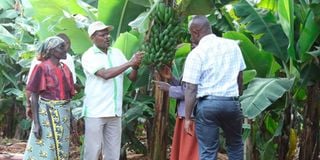Kisii farmers lose hope in growing bananas for profit as factory fails to take off

Farmers in Kisii being trained on banana growing. Almost a decade after the Kisii County government promised to build a banana factory, the project has not taken off, leaving farmers who embraced the crop with hopes of benefiting from it in a dilemma.
At the onset of devolution, the Kisii County government announced plans for a major project to improve the production of bananas, adding value to them and ensuring farmers benefit.
But, almost a decade later, the project has not taken off, leaving farmers who embraced the crop with hopes of benefiting from it in a dilemma.
Alloys Obwoge is one such farmer.
He says he cut down most of his banana plants on his small farm in Bobaracho village after failing to get returns from them.
“We only plant for our own consumption now,” said Mr Obwoge, who is among thousands of residents who have lost hope in commercial banana growing.
Mr Obwoge says middlemen take advantage of lack of a ready market and dictate prices to them.
“We end up selling our bananas at very low prices. We have no bargaining power.”

A trader sells bananas on a bicycle in the streets of Kisii town. Banana is the main food crop in Kisii, which is the leading producer in Kenya.
Main food crop
Banana is the main food crop in Kisii, which is the leading producer in Kenya.
The area under bananas in Kisii is slightly above 6,350ha, with an average production of 56 tonnes per hectare annually. This translates to 359,600 tonnes of bananas annually.
Some residents had turned to the commercial farming of the crop after the county leadership announced plans to build a Sh156 million factory.
A joint project with the European Union and the Kisii County government, it was to help offer a ready market for banana farmers in the region.
Other counties in South Nyanza - Nyamira, Migori and Homa Bay - were also expected to benefit, with their farmers getting a ready market too.
Most farmers in this region have been selling their produce in local markets and on roadsides.
Middlemen
The factory was expected to help get rid of middlemen, whose role in the value chain is significant but to the disadvantage of farmers.
The European Union gave Kisii County a Sh110 million grant to develop the banana value chain, while the devolved unit set aside Sh45 million to help build the processing plant from scratch.
Though construction of factory, at the Kisii Agriculture Training Centre, is complete, it has yet to start operating because the county has not found an investor to run it.
Only the factory structure is ready, but the county is yet to install machines and other equipment necessary for processing bananas.
The county government says it has held discussions with several potential investors and that there are hopes that one will come on board soon.
Goes to waste
About 32 to 40 per cent of the fresh banana produce from Kisii goes to waste due to poor handling, right from the farm to the market.
“It is this wastage that the county government in partnership with the European Union wants to address through value addition,” said Kisii Governor James Ongwae.
Once work starts at the factory, over 500 jobs will be created along the banana value chain.
The county enjoys enormous comparative advantage in banana production due to its favourable agro-climatic conditions.
“The Kisii cooking banana variety in particular occupies a unique market niche due to its taste. This is the reason the big Kenyan cities and major towns consume a huge amount of our fresh bananas,” Mr Ongwae said.
Chipping and drying
The project also aims to make the shelf life of bananas from the region longer through chipping and drying.
The overall objective is to contribute to improved socio-economic development in Kisii County, as well as enhance value addition through banana processing for improved income and employment.
The project targets the main banana value chain actors who are input suppliers, 2,250 members of banana cooperatives in 45 wards, producers, marketers, brokers, transporters, consumers and the county government as beneficiaries.
The current farm gate prices for an average 70kg bunch of bananas is Sh200 whereas the retail price is Sh450 in the same locality. Outside the county, a bunch of bananas sells for up to Sh900.





